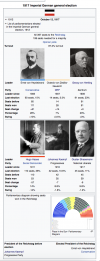All sounds very plausible; I'll admit I'm far from an economist, though.
The German economy is in a slight postwar slump but nothing too serious; once the specie really gets rolling in from France things will improve substantially!
Couple thoughts:
1. I'm reading the new update, like what I'm seeing so far.
2. I *would* urge some caution on the economic state of Germany in these circumstances. I think it is easy to understate just how badly even two years of Great War can run up the red ink and disrupt the economy. Wiki has a decent pull from
Economic History Review:
Total spending by the national government reached 170 billion marks during the war, of which taxes covered only 8%, and the rest was borrowed from German banks and private citizens. Eight national war loans reached out to the entire population and raised 100 million marks. It proved almost impossible to borrow money from outside. The national debt rose from only 5 billion marks in 1914 to 156 billion in 1918. These bonds became worthless in 1923 because of hyperinflation.
Now that's with four years of war. Cut that in half, roughly, for a war that ends in 1916. That's still *horrific*.
And then, you have to pay to take care of millions of wounded soldiers....
Reparations is the hope here, but it's not one that can make the Germans whole anytime soon. The French will be paying on the installment plan, and struggling to do even that, since their economy is in even WORSE shape than that of Germany. Russians will have to pay largely in commodities, and they may struggle to do even that, what with political instability.
This is one more reason why I cannot see a vigorous naval armaments program. I think they probably still finish out the
Bayern and
Mackensen classes on a reasonable (not frenetic) schedule, but they likely retire (or if they can, sell) all the pre-dreads and some older cruiser classes to save money and manpower. They know their minefields and torpedo boats can keep Britain from Copenhagening them now anyway.

